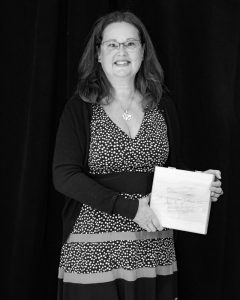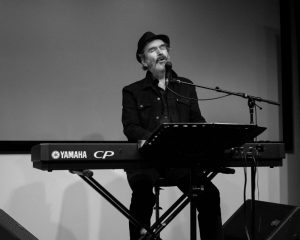This year, Nicole Beausoleil was honoured with the ninth annual Christopher J. Reed Award, presented by APEM (the Association des professionnels de l’édition musicale), with the support of SOCAN during the Rendez-Vous Pros des Francos. Beyond the tribute paid to her during the event, the award highlights and celebrates her involvement with artists and her outstanding contribution to the recognition of their rights, both here and abroad.

Photo: Marie-Michèle Bouchard
The founder and President of Productions Nicole Beausoleil has worked in the field of copyright for more than 30 years. Through her business, she’s been working alongside screen composers since 1996.
“I grew up in a household where music was everywhere,” says Beausoleil, still marvelling at the fact. But it was while she was actually creating music herself that she was struck by the importance of the rights attached to it. “The day comes where you don’t have a choice but to look into copyright,” she says sincerely.
While she was working at SOCAN precursor organization SDE (the Francophoine counterpart to PROCAN), Beausoleil cut her teeth among a group of colleagues and mentors who “were mostly women,” she says. “I worked with Joanne Pouliot, who was a role model for me when I started. Towards the end of my time at SOCAN, I was in charge of A-V [audio-visual]. That’s when I realized I was cut out to work in screen composing.”
Although working an environment that was predominantly female didn’t stand out to her at first, she now recognizes that the people around her, when she began, played a role in shaping her career. “I was quite young when I started out, and I didn’t think along those lines, then,” she explains. “But later I realized that being encouraged to move up the ladder changed everything. The fact that I expressed a desire to move into a new role was valued. That gave me the confidence I needed to create my own job later on.”
Among the key moments that confirmed this choice, in hindsight, Beausoleil names those instances when an artist needs someone who understands their publishing rights. “When you’re working on a TV series and you know there’s a problem with the royalties, but you manage to untangle the dossier, it’s a success that feels great every time,” she says. “Making music for television is more often than not high-pressure work, so it’s that much more satisfying to know that I’m able to render my composers’ work highlighted and respected.”
Beausoleil remembers 1996 as a time when being a freelancer wasn’t in vogue. “The producers I worked with had a hard time taking me seriously, but I won them over after awhile,” she says. “I never hesitated to travel and present my reports in person, as a way to show that I was invested. Nevertheless, the first five years were hard. I had to explain a ton of stuff to everyone.”
“It never fails: I’m always impressed by the quality and beauty of the music composed for our TV series”

Pierre Flynn performs at the ceremony awarding the Christopher-J.-Reed Prize to Nicole Beausoleil. (Photo: Marie-Michèle Bouchard)
For Luc Sicard, Éric Lemoyne, Dazmo, and other screen composers, Beausoleil is a vital bridge between music creators and the production. The repertoire she administers includes more than 600 audio-visual works distributed throughout the world. Her clients include most of Québec’s major production companies.
“The number of A-V works sold internationally that we have in Québec is quite exceptional,” she says. “That means the work I do is vital. One needs to be perceptive and meticulous. It’s a trade where you often find yourself between a rock and a hard place. You have to be there for the composer and their publisher, and do your darndest to serve everyone’s best interest.”
But despite all the hard work, Beausoleil is mainly driven by her passion. “I use the word ‘work,’ but it has a different meaning for me,” she says. “My trade is highly niche. If you tell people you manage an artist, they know what you do, but when I tell people I manage publishing for A-V works, people have no idea what I’m talking about,” she says, giggling. “Luckily, everyone around me is also driven by passion. The people I’ve worked with over the last 30 years have become my friends.”
One of her favourite times of the year is the launch of the fall TV season, which is when she can see the results of her efforts onscreen. “I’m a big consumer of TV series and films,” she admits. “It never fails: I’m always impressed by the quality and beauty of the music composed for our TV series. Music becomes a character in and of itself. It’s a very important aspect of a series’ success.”
She also hopes to see an increasing number of women composing for local series and films. “We always refer to the same examples when we talk about the place of women,” she says. “I think the door will open a little wider when a movie that was produced here [in Québec], and whose score was written by a woman, gets worldwide distribution.
“Screen composing is something that’s often a side gig to a career as a musician, but we’re lucky enough to live in an era where one doesn’t necessarily have to choose one over the other. That’s why I believe the possibilities are there, and the revolution in our trade is near.”